How to Avoid Foods That Spike Your Blood Sugar Levels – Best Meal Substitutions for Diabetes
| Author: Manoja Kalakanti
Whether you like it or not, your dietary habits are directly related to the probability of causing diabetes or worsening the condition. So, if you are in the pink of your health and wish to avoid the condition or are already suffering from it, it’s high time you keep track of what’s on your plate. In this article, we’ll talk about the 13 worst foods to avoid to control sugar levels. We’ll also highlight some crucial diet tips to control diabetes.
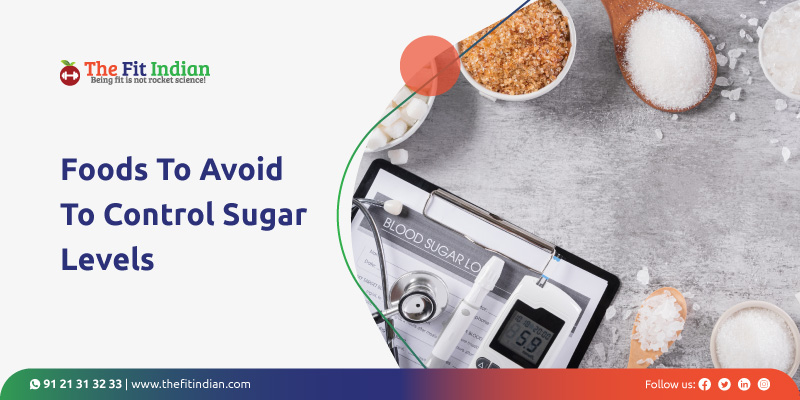
The factors leading to diabetes can be divided into irreversible and reversible factors. Controlling factors such as the family history of illness or genetics, age, and race or ethnicity may be out of your hands. But there are reversible factors, often the most common reason for the condition, such as diet and lifestyle, that can be easily controlled.
Uncontrolled diabetes can result in severe health issues such as high blood pressure, heart diseases and hypertension. It can also cause an array of low-risk health problems. The typical symptoms of diabetes may include increased thirst, frequent urination, extreme hunger, unexplained weight loss, fatigue, irritability, blurred vision, sweating, and slow-healing sores. Many factors are responsible for the development of the condition, such as smoking, environmental factors, sedentary lifestyle, certain medicines, excess alcohol intake, and lack of physical activity. Let’s look at the foods that you must avoid or limit and foods that instantly lower blood sugar, thereby the ones you must include in your diet.
13 Worst Foods to Avoid to Control Sugar Levels
Fancy that delicious cookie? Caved in to the hunger pang and had a slice of pizza? Or did you skip a meal? The smallest decisions you make have a massive impact on your diabetes management. Snacking on unhealthy junk food or desserts or irregular eating habits can derail your efforts to keep your glucose levels in check. The relation between diabetes and food cannot get any simpler. There are foods that lower blood sugar and foods that cause a spike. The successful management of diabetes relies on avoiding or limiting foods that quickly increase sugar levels. Consuming food that controls blood glucose levels can help you manage the condition and avoid the health consequences.
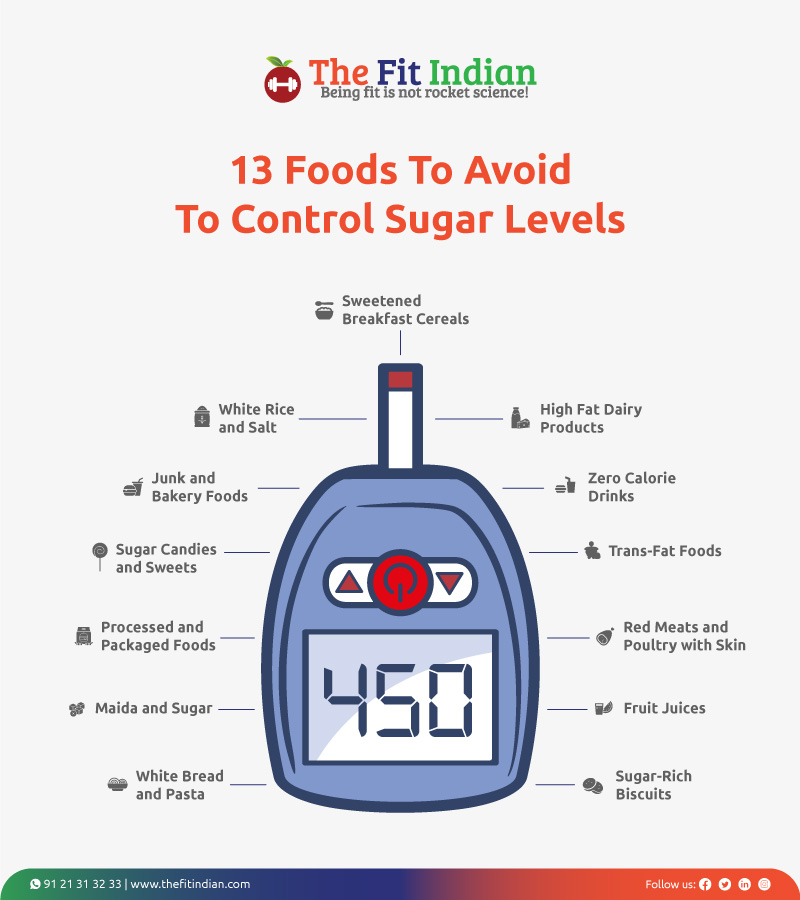
You should always prefer natural foods to reduce blood sugar. Avoid or limit foods that are high in sugar, unhealthy fats, and refined carbohydrate. Keeping an eye on carbohydrate consumption is extremely crucial. It has the highest impact on sugar levels. Not all carbs are bad though, simple carbohydrates such as sugar and white bread are the culprits, while complex carbs such as oatmeal and brown rice are healthier. But even healthy carbs must be consumed within a limit to keep diabetes under control. Substitute the following worst foods with a healthier option, as shown below.
1. White Bread and Pasta
White bread and pasta have become common household names. Most of the commercially available packaged pasta is made from refined flour and is highly processed. It is also high in carbs. If you love your pasta, you can opt for the whole wheat one. White bread is highly processed, high in the glycemic index and contains unhealthy ingredients.
Substitutions:
- Brown bread, whole grain pasta, whole wheat bread, oat bread, multigrain bread, and multigrain pasta.
Harmful effects of consuming white bread and pasta:
- Eating white bread and pasta often can be dangerous because it could lead to regular spikes in blood sugar.
- They are deficient in nutrients which cause the immune system to falter.
- They also lead to increased hunger, which again leads to weight gain.
- Highly refined foods are associated with an increased risk of major cardiovascular diseases, strokes, and heart attacks.
2. All Purpose Flour (Maida) and Sugar
Sugar is undoubtedly one of the worst foods for people with diabetes. It is heavily processed and refined and is high in the glycemic index. It quickly raises blood sugar levels. Maida or white flour has a high glycemic index and can cause a spike in blood sugar levels. It is highly processed and refines, stripping it off most nutrients. Maida also raises the bad (LDL) cholesterol levels and can clog arteries and increase your weight.
Substitutions:
- Ragi flour, jowar flour, bajra flour, buckwheat and soy flour are substitutes for maida.
- Brown sugar, stevia, xylitol, maple syrup, coconut sugar (anything in moderate amounts) are good substitutes for sugar.
Harmful effects of consuming maida and sugar:
- Maida flour increases their risk for weight gain, obesity, insulin resistance and elevated cholesterol.
- Maida can congest the digestive system and contain no fibre.
- Consuming too much added sugar increases risk factors such as high blood pressure, obesity, inflammation, and high sugar levels.
3. Processed and Packaged Foods
Processed and packaged foods are the epitome of bad food. They are often blamed for being the single biggest contributor to many modern-day diseases. They are highly processed and full of additives to increase shelf life.
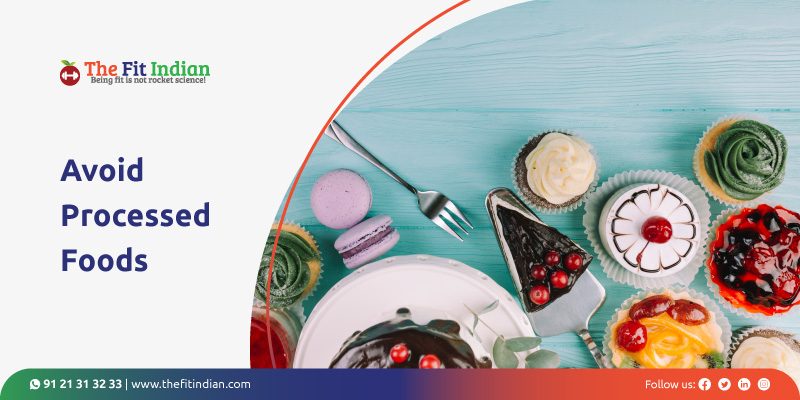
They also include sugar, unhealthy fats and other questionable ingredients. Steer clear of processed and packaged foods as much as possible. Go for whole foods such as fruits and fresh and healthy vegetables that reduce blood sugar to control sugar levels.
Substitutions:
- Always include fresh foods only like fruits, almonds, cashews, kale chips, baked sweet potato chips, sunflower seeds, macadamia nuts, Brazil nuts, homemade cereal mix, vegetable chutneys, makhanas, roasted chana, boiled chickpeas, boiled sprouts, sprouts chat.
Harmful effects of consuming processed and packaged foods:
- Processed and packaged foods are harmful because they contain higher amounts of unhealthy fat, sugar and salt.
- They contain empty calories because they lack nutritional value.
- These foods have been linked to an increased risk of a wide variety of health problems that can lead to heart disease, elevated cholesterol, and cancer.
- The body breaks down refined or simple carbohydrates quickly, leading to rapid spikes in blood sugar and insulin levels.
4. Sugar Candies and Sweets
Sugar candies and sweets are rich in sugar and are quickly digested; hence cause a spike in sugar levels. They are also devoid of any nutrients and contain other harmful ingredients. There are many naturally sweet and equally satisfying treats.
Substitutions:
- Fresh fruits, homemade popsicles, fruit chips, frozen fruits, energy balls, dry fruit laddu, peanut chikki, sesame and flaxseeds laddu, fruit puddings, sugar-free brownies, dark chocolate, strawberries covered with dark chocolate.
Harmful effects of consuming sugar candies and sweets:
- Excessive sweets and candies have been associated with nonalcoholic fatty liver disease, heart disease, tooth decay and type 2 diabetes.
- When you eat excess sugar, the extra insulin in your bloodstream can affect your arteries all over your body.
- It causes walls to get inflamed and stiffer and damages the heart over time.
5. Junk and Bakery Foods
Junk and bakery foods are rich in unhealthy fats and sugars, leading to obesity, heart disease, and diabetes. It can cause a quick spike in blood glucose levels.
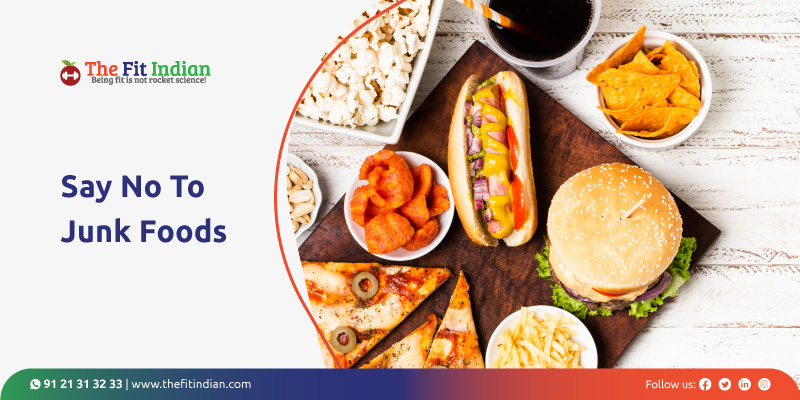
Substitutions:
- Baked veggie fries, Greek yoghurt with berries, green chips, boiled peanuts, crackers, dry fruits, grilled fish/chicken, chicken tandoori, tofu tikka, grilled veggies, eggs with hummus, whole wheat egg/chicken wraps, lettuce salmon wrap, multigrain bread omelets.
Harmful effects of consuming junk and bakery foods:
- Junk and bakery foods are high in trans and saturated fats, which can raise levels of triglycerides.
- Elevated levels of triglycerides increase the risk of developing type 2 diabetes.
- It also lessens its ability to control appetite.
- It makes you impatient and can cause uncontrollable cravings.
6. White Rice and Salt
White rice is the result of processing that strips away most of the nutrients from the whole rice, thereby stripping it off its nutrients. They are digested quickly and cause an immediate blood sugar level spike. Salt in moderation is highly beneficial for health; iodine deficiency can lead to many illnesses. Salt can increase blood pressure and the risk of diabetes.
Substitutions:
- Brown rice, wild rice, cauliflower rice, quinoa cooked, black rice, Himalayan pink salt, natural sea salt, Chinen salt, garlic and onion powder, cumin powder, sage, celery, and lemon squeeze.
Harmful effects of consuming large amounts of white rice and salt:
- White rice has a high glycemic index, meaning that it can cause spikes in blood sugar.
- It is also low in fibre and digests very easily and quickly.
- Overeating salt can contribute to high blood pressure, which is linked to conditions like fluid retention, stroke, heart failure.
- It is important to limit the amount of salt you eat as part of your diabetes management.
7. Sweetened Breakfast Cereals
The so-called healthy breakfast cereals are anything but healthy. They are highly processed, and rich in sugars and carbs. They also come with misleading claims promoting health benefits.
Substitutions:
- Rolled oatmeal, steel-cut oatmeal, oat bran, wholegrain cereals, cauliflower porridge, peanut butter toast, almond butter toast, fruit topped yoghurt, shredded wheat, avocado toast, chia oats pudding, strawberry oats smoothie, almond milk cocoa shake.
Harmful effects of consuming sweetened breakfast cereals:
- They contain excessive amounts of free sugars, low in protein and fibre.
- Eating sweetened breakfast cereals is very unhealthy and the worst way to start your day with type 2 diabetes.
- High fructose corn syrup is the most common sweetener used in breakfast cereals, leading to insulin resistance, type 2 diabetes, and blood pressure.
8. High-Fat Dairy Products
High-fat dairy products contain excess fat and calories. They can cause several diseases such as obesity and heart diseases. For a proper diet to lower blood sugar, replace these products with healthier options.
Substitutions:
- Plant-based milk like almond milk, soya milk, coconut milk, oat milk. Low-fat milk, skimmed milk, hemp milk, cottage cheese, grass-fed butter, low-fat paneer.
Harmful effects of consuming high-fat dairy products:
- High-fat dairy products are associated with cardiovascular diseases, which lead to clogged arteries.
- When taken in large amounts, they contain high saturated fats, leading to a rise in blood sugar levels.
9. Trans-Fat Foods
Trans fats raise your LDL (bad) cholesterol and can cause heart diseases and stroke. People with diabetes must avoid foods high in trans fats.
Substitutions:
- Substitute foods rich in trans fats like junk and fried foods with baked, boiled, steamed, and grilled foods. Try baked chips, boiled sweet potatoes, baked kale chips, homemade muffins, brownies, wheat cookies, and whole-grain toast.
Harmful effects of consuming trans-fat foods:
- Trans fat foods may lead to type 2 diabetes and heart diseases as they increase inflammation in the body.
- Trans fats are believed to damage the inner linings of your blood vessels, which is known as the endothelium.
- A higher intake of trans fat leads to a rise in triglycerides and LDL levels.
10. Red Meats and Poultry with Skin
Red meat in small amounts is good for your health but try to limit its consumption. You must especially avoid processed meat; they are considered to be a carcinogen by the WHO (World Health Organization) and cause several health problems such as heart diseases and obesity. The poultry skin is high in fats; hence it can be harmful to people with diabetes.
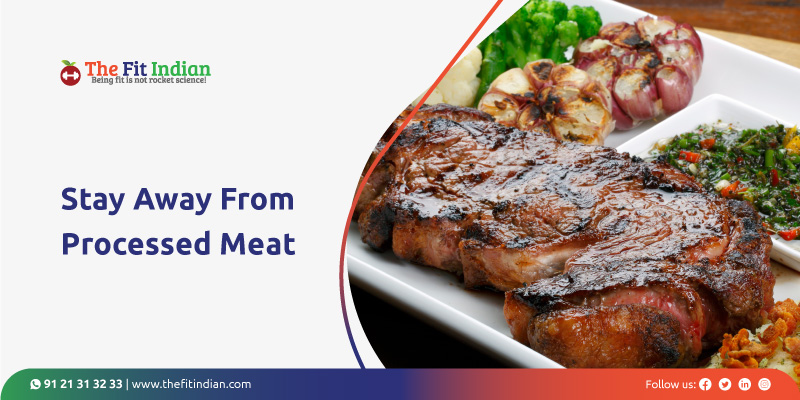
The poultry skin is high in fats; hence it can be harmful to people with diabetes.
Substitutions:
- Chicken breast, salmon, oily fishes, tofu, tempeh, mushrooms, ground turkey, eggs, country chicken.
Harmful effects of consuming red meats and poultry with skin:
- Red meats tend to have both saturated fats and cholesterol levels, which increase the risk of heart diseases.
- The type of red meat you choose also affects your blood glucose levels.
- These are also associated with an elevated risk of colon and liver diseases.
11. Empty Calorie Drinks
Soft drinks, sports drinks and energy drinks may be tempting and even promoted as healthy, but they are far from healthy. They contain no nutritional benefits and are often high in sugar content, which raises blood glucose levels.
Substitutions:
- Fruit-infused water, lime juice, coconut water, buttermilk, mint-infused water, chia seeds water, cucumber-infused water.
Harmful effects of consuming empty calorie drinks:
- Over-indulgence of foods and beverages made from empty calories create an elevated risk of obesity, high cholesterol, diabetes, and heart disease.
- They have also been linked to depression, anxiety, and other mental health disorders.
12. Fruit Juices
While whole fruit is healthy and nutritious, commercially available packaged fruit beverages are unhealthy. They have a high quantity of sugar and other preservatives. Even most fruit juices in restaurants are unhealthy, for they throw away the pulp and what remains is the fruit’s natural sugar!
Substitutions:
- Fresh fruits, homemade juice like apple juice, beetroot juice, carrot juice, fruit infused water, lemon juice, and fresh fruits homemade juices.
Harmful effects of consuming fruit juices:
- Packaged fruit juice beverages contain excessive amounts of sugar, making insulin spike very quickly.
- They have harmful chemicals in them.
- They cause gout in women and has significantly fewer nutrients.
13. Sugar-Rich Biscuits
As the name suggests, sugar-rich biscuits are rich in sugar; hence, they must be strictly avoided. They are also devoid of much nutrition. Many brands that claim to offer healthy alternatives are often deceiving the consumers.
Substitutions:
- Homemade wheat cookies, sugar-free muffins, chocolate chip biscuits, almond cake with ragi, flaxseeds crackers.
Harmful effects of consuming sugar-rich biscuits:
- Biscuits contain sodium benzoate, which causes DNA damage.
- They also contain baking soda, which causes acid reflux problems.
- Biscuits are high in carbohydrates, which spike insulin quickly.
- These cause sugar addiction, binge eating and eating disorders and causes type 2 diabetes.
Following the above substitution diet is the best way to reduce blood sugar. But managing diabetes can be made much more effective by combining a healthy diet with a lifestyle. Inculcate the lifestyle habits as shown below to control sugar levels effectively.
Lifestyle Modification For Diabetes
Diet plays the most crucial role in successfully managing diabetes, but changing your lifestyle is also essential in effectively controlling the condition.
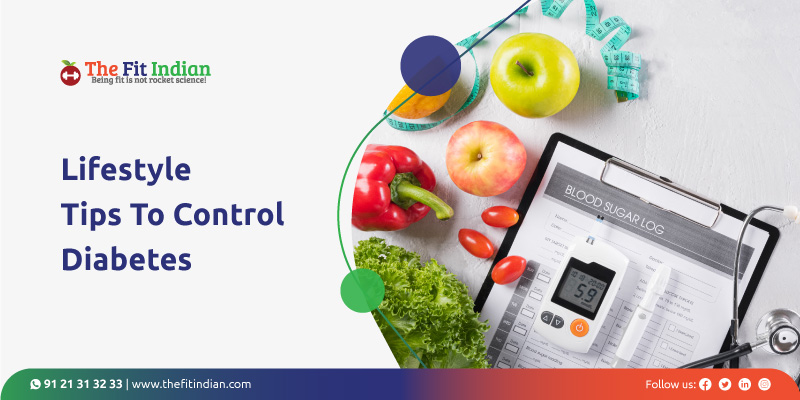
Follow these simple steps along with a healthy diet to complete your diabetes management plan:
1. Regular exercise
Health experts recommend regular moderate to intense exercise. But even being physically active for 30 minutes each day can help a lot. You can do the following activities to stay active and fit:
- Brisk walking
- Cycling
- Hiking
- Jogging
- Swimming
- Skipping
- Sports
2. Manage Stress
Stress is the cause of many illnesses, and it is vital to manage it for optimal health. Your body responds to stress by releasing stress hormones which increase blood pressure, glucose levels and can cause heart problems, mental illness and hypertension, among other conditions. Constant stress can make it difficult to control glucose levels. Take a deep breath, exercise, meditate, practice mindfulness and engage in a hobby to manage stress.
3. Avoid Smoking and Alcohol
Alcohol in moderation does not have a negative effect on your health. But excessive consumption can cause several illnesses such as heart disease, stroke, high blood pressure and liver disease. Alcohol can also cause a drastic change in blood sugar levels.
Smoking can cause several health problems such as heart disease and high blood pressure. Nicotine raises blood sugar levels, so kick that butt before you kick the bucket!
4. Constantly Check Your Sugar Levels
Checking your sugar levels can help you understand the impact of various factors on your glucose levels. It can tell you how exercise, medications, illnesses and food affect your blood sugar levels. This will help you to understand the condition better and manage it effectively.
Get help from your doctor to create a plan to help you with the transition. With dedication and consistency, you can successfully control sugar levels.
Conclusion
The first step towards the successful management of diabetes is understanding the impact of the food you eat on the condition. By following a healthy lifestyle, diet and proper medication, you can control sugar levels and also avoid the risks associated with diabetes. Eat more foods that regulate blood sugar and avoid or limit the ones that can cause a spike in glucose levels. It is advised to consult a doctor or a nutritionist to guide you with a proper meal plan and other lifestyle modifications. With a bit of guidance and effort, you can overcome the condition and lead a healthy life.
FAQ’s
1. How to control sugar levels
Follow these diabetes management tips to control sugar levels:
- Exercise regularly
- Keep an eye on the carbohydrate intake
- Consume more fibre
- Keep yourself hydrated throughout the day
- Avoid junk foods, processed and packaged foods
2. Can a diabetic patient eat chicken?
Chicken is a great source of lean protein for people with diabetes. It is low in fat and carbs, especially chicken breast. A diabetic patient can eat chicken as long as the method of cooking is healthy.
3. Is corn flour good for diabetes?
Diabetes patients must either avoid corn flour or limit its consumption. Corn flour is starchy and is devoid of many nutrients.
4. Can people with diabetes eat honey?
Honey has anti-inflammatory and antioxidant properties, which can be beneficial for people with diabetes. But being a carbohydrate, honey will have an impact on blood glucose levels. It is better than sugar but still impacts your glucose levels; if you must consume honey, preferably raw, organic and pure honey.
5. What foods to eat to lower sugar levels?
Eat from this list of foods that lower blood sugar
- Leafy green vegetables
- Nuts
- Seeds
- Fatty fish such as salmon
- Eggs
- Oatmeal
- Apple
6. How often to eat to control blood sugar?
It is crucial to regularly eat when you have diabetes to keep your blood sugar levels in check. Try eating every 3 to 4 hours and ensure that you follow the daily schedule; it keeps your sugar levels from fluctuating.
7. Are peanuts good for diabetics?
Peanuts are an excellent snacking option for people with diabetes. It has a very low glycemic index score, which prevents it from spiking your sugar levels. It is also a rich source of plant-based protein and healthy fats.
8. What do you eat when you have type 2 diabetes?
You can consume the following foods if you have type 2 diabetes:
- Nuts
- Vegetables
- Fruits such as apples that are not too sweet
- Fatty fish
- Eggs
- Complex carbohydrates such as brown rice and oatmeal
- Beans
9. How to control blood sugar with home remedies?
The best way to control blood sugar is through natural home remedies. They are highly effective and has no side effects either. Drink a lot of water, implement portion control, exercise regularly, manage stress levels and constantly monitor your sugar levels to control diabetes at home.
10. What’s the best way to manage diabetes without medication?
Lifestyle changes, including a healthy diet, can go a long way in managing diabetes without any medications. You can eat a healthy diet, lose weight, manage stress, stay physically active and get adequate sleep to control the condition without any medicines.




Manoja Kalakanti